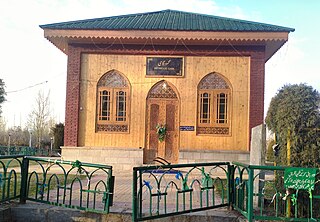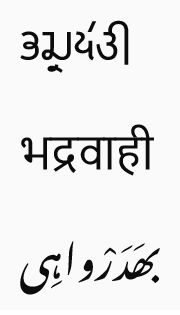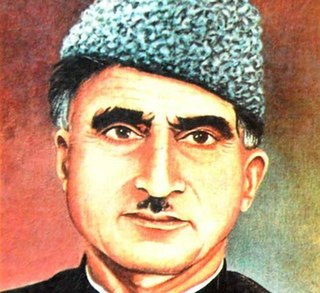Related Research Articles
Literature of Kashmir has a long history, the oldest texts having been composed in the Sanskrit language. Early names include Patanjali, the author of the Mahābhāṣya commentary on Pāṇini's grammar, suggested by some to have been the same to write the Hindu treatise known as the Yogasutra, and Dridhbala, who revised the Charaka Samhita of Ayurveda.
Zinda Kaul (1884–1965) was an Indian poet, writer and teacher. He composed in Persian, Hindi, Urdu and Kashmiri. Kaul also translated works of Kashmiri into English, Persian and Hindi.

Mahmud Gami (1765–1855) was a nineteenth-century Kashmiri poet from Doru Shahabad, Anantnag, Kashmir. Mahmud Gami is one of the most prominent Kashmiri poets of the medieval period. Through his poetic compositions he is well known to introduce Persian forms of Masnavi and Ghazal, to the Kashmiri language. He is popularly known as the Jami of Kashmir.
Amin Kamil (1924–2014) was a Kashmiri poet.

Abdur Rehman Rahi was an Kashmiri poet, translator and critic. He was awarded the Indian Sahitya Akademi Award in 1961 for his poetry collection Nawroz-i-Saba, the Padma Shri in 2000, and India's highest literary award, the Jnanpith Award in 2007. He is the first Kashmiri writer to be awarded the Jnanpith, India's highest literary award for his poetic collection Siyah Rood Jaeren Manz. He was honoured with Sahitya Akademi Fellowship in 2000 by Sahitya Akademi, New Delhi.
Mohammad Yousuf Taing, also known as M. Y. Taing, is a researcher, scholar, critic, writer, politician and historian. He is also biographer of Sheikh Abdullah. He is a prolific literary thinker writing in three Indian languages.

Bhadarwahi is an Indo-Aryan language of the Western Pahari group spoken in the Bhaderwah region of Indian administered Jammu and Kashmir.

Professor Ghulam Nabi Firaq was an Indian Kashmiri poet, writer and an educationist.
Jitendra Udhampuri is an Indian writer of Dogri, Hindi and Urdu literature. He is a recipient of the Sahitya Akademi Award in 1981. The Government of India honored him in 2010, with the fourth highest civilian award of Padma Shri.

Ghulam Nabi Gowhar was a multilingual Indian Kashmiri author, novelist, poet, columnist and a retired sessions jurist. He wrote about sixty books in Kashmiri, Urdu, and in English languages on various subjects such as politics, literature, history and on Sufism. In 1971, he wrote a novel titled Mujrim, leading him to become the "first novelist of Kashmiri literature". The recipient of cultural and literary awards and accordion, including Sahitya Akademi Award, he is also credited for translating constitution of India into Kashmiri language.

Mir Ghulam Rasool Nazki, also spelled Meer Ghulam Rasul Naazki, was a Kashmiri poet, writer, broadcaster, and teacher. He wrote books, including poetry in regional and foreign languages such as Urdu, Persian, Arabic and later work in Kashmiri language. The receipent of Sahitya Akademi Award for Awaz-e-dost, a Kashmiri poetry, he is also credited as the "first Kashmiri writer" to write in Ruplic of India after independence, and the first poet to resuscitate quatrain poetic form in Kashmiri literature, which originally began during the period of thirteen and fourteenth century poets such as Lal Ded and Nund Reshi.

Ghulam Mohiuddin Hajni was an Indian writer, critic, political activist and teacher. He wrote in regional and foreign languages such as Urdu, Persian, Arabic and primarily in Kashmiri language. In 1970, he became the recipient of Sahitya Akademi Award for his research publication titled Maqalati Hajini.
Mohammed Ramzan Bhat, known by his pen name as Mashal Sultanpuri, was a Kashmiri poet, writer and critic. He was primarily engaged in writing Kashmiri prose. Prior to his appointment as a patron of Adbee Markaz Kamraz, the oldest literary organization of Jammu and Kashmir, he served as a president of AMK. In 2009, he became the recipient of Sahitya Akademi Award for his literary criticism book titled Vont. He was among the other campaigners who helped Kashmiri literature to be included in curriculum.
Aziz Hajini was a Kashmiri writer, poet, critic and convenor of Sahitya Akademi for New Delhi's Northern Regional Board. He served as a government school teacher for 30 years before being appointed as assistant professor at the department of Kashmiri of the University of Kashmir until he retired from active service in 2019. In between he was appointed secretary of Jammu and Kashmir Academy of Art, Culture and Languages in 2015 by PDP led government which evoked severe criticism in the media for his alleged links with the separatists.
Ghulam Ahmad Fazil Kashmiri was a Kashmiri poet and lyricist. He was involved in Arabic, English, Persian, Urdu and particularly in Kashmiri literature. His uncertain work includes thirty six books published in various genres such as ghazal, nazm, rubaʿi, qata, marsiya, munajat, naʽat, manqabat and leela among others.
Professor Rashid Nazki, was a Kashmiri poet, teacher, author, critic and the founder of the Adbi Markaz Kamraz Jammu and Kashmir, a nonprofit literary organization of the Jammu and Kashmir state dedicated to promote Kashmiri language and literature. He wrote biography of Islamic Prophet Muhammad, leading him to become the first Kashmiri writer to cover the life of Muhammad.
Mushtaq Ahmad Tantray is an Indian writer, broadcaster and journalist. Currently serving as deputy director of Radio Kashmir Srinagar for news department, he previously worked as a newsreader at Radio Kashmir, Srinagar and DD Kashir.
Autar Krishen Rehbar was an Indian dramatist, short story writer, literary historian and the former deputy director of Radio Kashmir, Srinagar. He wrote several books of short stories such as Talash (Search), and Bi Chus Tsur.
Shad Ramzaan is an Indian writer and scholar. He wrote his first poem at the apparent age of 15. During his career, he wrote numerous poems such as Kore Kakud Pushrith Gome for which he was awarded Sahitya Akademi Award in Kashmiri in 2014.

Chewdara or Chivdora, is a village in the Rathsun block of the Beerwah tehsil in Budgam district of Jammu and Kashmir, India. It is located 21 km (13 mi) towards west of the Budgam district headquarters, 3 km (1.9 mi) from Beerwah and 23 km (14 mi) from the winter capital Srinagar. Chewdara has two panchayats, Chewdara-A and Chewdara-B.
References
- 1 2 Roy, Devapriya (21 February 2016). "A reader's guide to the 24 books that have won the Sahitya Akademi awards". Scroll.in. Retrieved 4 May 2021.
- ↑ "Two Muslim writers selected for Sahitya Akademi Award 2015 - The Siasat Daily". The Siasat Daily - Archive. 20 December 2015. Retrieved 4 May 2021.
- 1 2 3 "Bashir Bhadarwahi". Greater Kashmir. 17 February 2018. Retrieved 4 May 2021.
- ↑ "KASHMIRI – Sahitya Akademi". Sahitya Akademi – SA (in Tagalog). Archived from the original on 23 June 2021. Retrieved 4 May 2021.